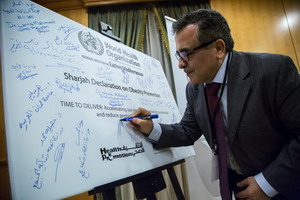
The World Health Organization’s Regional Meeting in Sharjah opened alongside the My Health 7th Regional Conference, organized by the Health Promotion Department of the Supreme Council for Family Affairs (SCFA) and held under the patronage of Her Highness Sheikha Jawaher Bint Mohammed Al Qasimi, wife of His Highness Dr Sheikh Sultan bin Mohammed Al Qasimi and Chairperson of SCFA.
Held on 26 and 28 November 2018 under the title “Talk, Listen, Change”, the Meeting focussed on the role of nutrition in preventing chronic diseases among the young.
WHO called for healthy food policies to be developed, urged EMR states to coordinate on implementing the United Nations Decade of Action on Nutrition programme, and to move quickly in tackling obesity.
A highlight of the event was the signing of the Sharjah Declaration on Obesity Prevention. The Declaration was announced by Iman Rashid Saif, Director of the Health Promotion Department, in cooperation with WHO. Meeting participants pledged to work on implementing the Declaration by increasing efforts to combat obesity in the Region and raising awareness of the problems it can cause.
The Meeting, which was co-organized by WHO and the Health Promotion Department at the SCFA in Sharjah, was attended by Dr Ahmed Selim Al-Mandhari, Regional Director of WHO EMRO; Iman Rashid Saif, Director of the Health Promotion Department at SCFA; Dr Hussain Al Rand, Assistant Undersecretary for Health Centres and Clinics at the Ministry of Health and Prevention and Dr Ayoub Al-Jawaldeh, Regional Nutrition Adviser at WHO EMRO. Officials and representatives from both public and private health providers from the UAE also attended, as did experts and representatives from countries in the Region.
One goal of the Regional Meeting, said Dr Al-Mandhari, was to share policies and programmes that help address the problem of obesity. He praised the efforts of the Emirate of Sharjah in promoting health awareness and combatting the spread of non-communicable diseases and commended Sharjah’s initiative in organizing the My Health Regional Conference with its focus on combatting obesity among young people.
Dr Al-Mandhari pointed out that recent figures on obesity had prompted a number of countries in the Region to implement national plans to reduce child obesity. Placing restrictions on the advertising and marketing of unhealthy foods to children, taxing sugar sweetened beverages and introducing healthier foods to meals served in schools are among the cross-sectoral policies some countries have adopted. Yet implementing such plans, Dr Al-Mandhari noted, can be difficult, and requires a strategic and practical vision.
Iman Rashid Saif said Sharjah, in accordance with the vision and the directives of His Highness Dr Sheikh Sultan bin Mohammed Al Qasimi, was committed to combatting obesity.
The United Arab Emirates has worked on the issue for years, she said, within the comprehensive national framework of UAE Vision 2021, and was especially focussed on reducing rates of obesity among 5 to 17-year-olds.
People represent Sharjah’s greatest asset, said Saif, and ensuring the health of its children is the emirate’s top priority.
Sharjah joined the WHO Healthy Cities programme in 2012, becoming the first city in the Region to be accredited as a WHO Healthy City and, in a ground-breaking achievement, was named the world’s first Child-Friendly City by UNICEF. Such accolades, said Saif, are testimony to what has already been achieved, though much work still needs to be done to reduce the risks faced by young people and protect future generations against the threats posed by obesity.
Dr Hussain Al-Rand, Assistant Undersecretary for Health Centres and Clinics at the Ministry of Health and Prevention, stressed that the UAE is keen to keep pace with the latest medical developments, and expressed his thanks and gratitude to Her Highness Sheikha Jawaher Bint Mohammed Al Qasimi for her support and patronage in hosting the regional meeting.
Al-Rand said rising obesity rates in the UAE had prompted the inclusion of the problem in the UAE Vision 2021 which targets a 12% reduction in obesity and overweight rates among 5 to 17-year-olds.
Dr Ayoub Al-Jawaldeh, Nutrition Adviser at WHO EMRO, pointed out that half of the Region’s adult women (51%) and more than two in five men (43.8%) were overweight or obese in 2014. He said the rates among children in the region were higher than the global average of 7% and in some countries topped 15%, while the problem was even worse among adolescents. In some countries more than half of all adolescents are overweight or obese.
Dr Al-Jawaldeh said WHO EMRO had responded to the challenges encapsulated in such statistics by developing the Regional strategy on nutrition 2010─2019 and plan of action which supports countries in establishing and implementing action on nutrition in accordance with their national situation and resources. The overall goal of the strategy is to improve the nutritional status of people throughout the life-cycle by encouraging countries to reposition nutrition as central to their development agenda.
The My Health 7th Regional Conference also included 14 panel discussions in which a variety of topics - including obesity, nutrition and the negative effects of obesity on the physiological and psychological health of young people – were highlighted.




